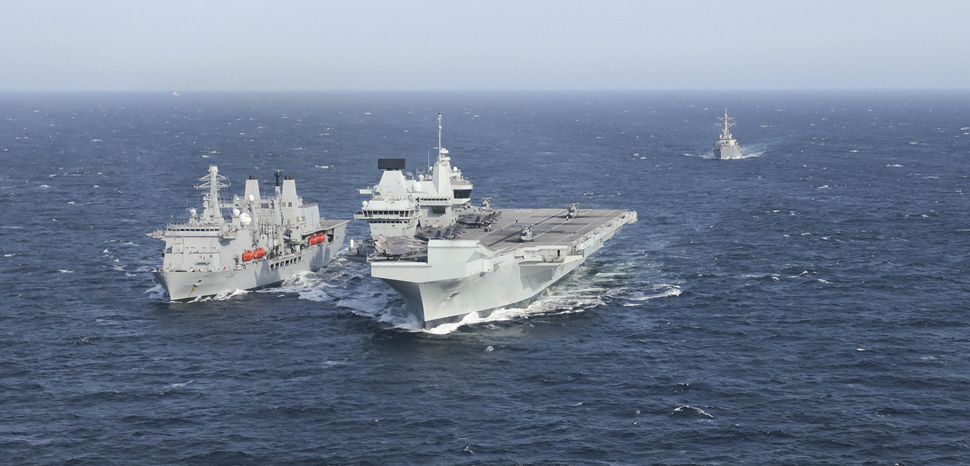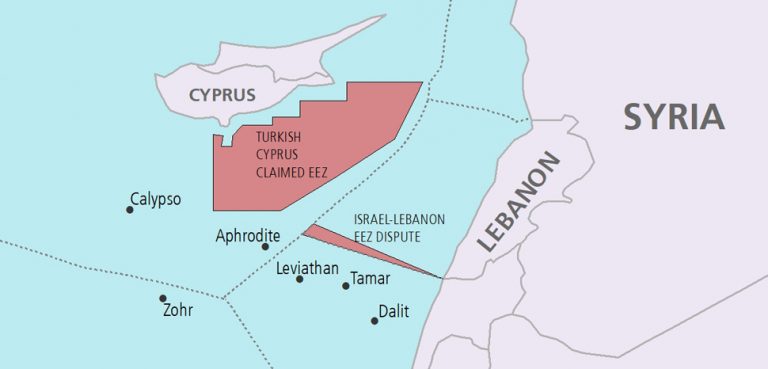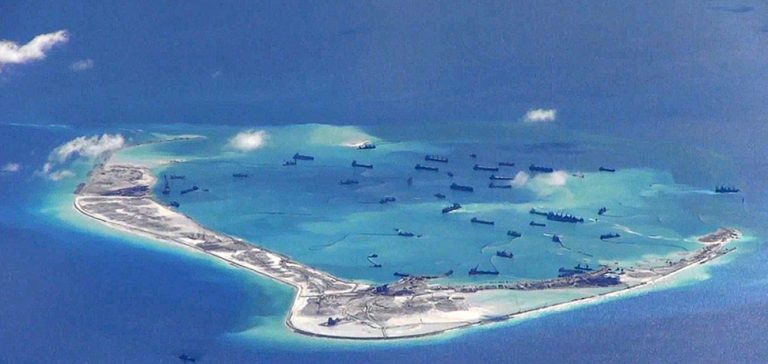In late March, the United Kingdom’s Ministry of Defense announced the UK would deploy a carrier strike group to the South China Sea as part of an international effort with Japanese, Dutch, Australian, and American vessels. Just a few weeks prior, France conducted freedom of navigation operations (FONOPs) in the South China Sea, an area contested by China and other Southeast Asian nations. These actions are the latest developments in a wider initiative by the United Kingdom and France in pivoting toward the Indo-Pacific as great power competition between the United States and China grows both in the region and beyond. The UK and France share a common interest in keeping the Indo-Pacific free and open, and yet they often act independently of one another in pursuing this goal. Instead, Paris and London should look to deepen their cooperation in the Indo-Pacific by realigning their strategic differences, furthering their operational coordination, and leveraging their existing relationships with European and Asian partners in the region.
Why it matters
Despite being half a world away, the Indo-Pacific is a strategically important region for Europe. The region is home to the world’s fastest growing economies and more than half of all global trade, or $5.3 trillion of goods, transits through its contested waterways each year. The European Union recently released a strategy for cooperation in the Indo-Pacific that outlines the need for increased European commitment to the region, while the UK’s March 2021 Integrated Review highlighted the importance of the Indo-Pacific for the government’s “Global Britain” initiative. But the continued rise of China has led to increased friction between Beijing and Washington, and it is vital for France and the UK to actively engage with the region to ensure their national interests are secured.
Strategic differences
France and the UK have different strategic perspectives on the Indo-Pacific. During the twilight era of the British empire, London left the security of the Indo-Pacific to its American and Commonwealth allies. Traditionally, the majority of the UK’s engagements in the Indo-Pacific have relied on using allies as facilitators in the region. For instance, the United Kingdom downgraded its bases in Singapore and now depends on joint-basing agreements to facilitate training and deployments as a member of the Five Power Defence Arrangement. In recent years, the UK has pursued a more active role in the Indo-Pacific by establishing a dedicated expeditionary force and conducting more frequent regional deployments such as sending the HMS Queen Elizabeth carrier strike group to the South China Sea for its maiden deployment. London has also pursued softer options to promote its influence, such as offering Hong Kong residents UK citizenship after Beijing’s crackdown on Hong Kong’s local government.
In contrast, France has stronger ties to the Indo-Pacific, including holding numerous overseas territories, enjoying a large Exclusive Economic Zone, and operating several active military bases in the region. Due to this extended presence, France is actively engaged in regional cooperative frameworks such as ASEAN, the Indian Ocean Rim Association, the Pacific Islands Forum, and the Regional Cooperation Agreement on Combating Piracy and Armed Robbery against Ships in Asia. France maintains a much more active presence in the Indo-Pacific and has demonstrated its willingness to defend its sovereign interests in the region. For example, over the last three years, the French military has routinely conducted at least two FONOPs per year in the South China Sea.
Despite these differences between the UK and France, their end goals in the region are the same. Both nations wish to see a free, open, and rules-based order in the Indo-Pacific. More importantly, they are both looking to increase their engagement as China’s influence expands. Deepening cooperation in the Indo-Pacific can be used as a means to counter or balance against increased Chinese aggression in the region.
Operational cooperation
As a first step toward increased engagement in the Indo-Pacific, France and the UK should restart their strategic bilateral dialogues with a focus on cooperation in the region. In addition, while both countries are already conducting joint large-scale maneuvers in the Indo-Pacific, they could better coordinate their deployments and efforts to lower maintenance costs for future engagement and operations. London already has some experience with this – the UK’s and Australia’s military strategies emphasize the integration of allied ships into their carrier strike group command structures to avoid over-extending each nation’s individual naval capabilities. Given their close military cooperation, France and the UK can build off this example to enhance bilateral cooperation in the Indo-Pacific and focus on developing a joint European effort. France is arguably the EU’s only member with a strong Pacific presence, and though the UK is no longer part of the EU post-Brexit, the two countries can work together to encourage Brussels’ efforts in the Indo-Pacific. Increasing European presence in the region is a vital part of upholding the security of the region and is a sign that London and Paris are willing to commit their most economically and politically expensive assets to promote a free and open Indo-Pacific.
Leveraging regional relationships
London and Paris each have close relationships with different Indo-Pacific countries that can be leveraged to advance mutual interests. While many states in the region have strong bilateral relationships with European nations, there is no overarching mechanism that enables European countries to influence the Indo-Pacific as a whole. France and the UK could fill in this void by generating lines of cooperation between European nations and the Indo-Pacific that would otherwise be lacking. France, with its strong presence in the Pacific, has close ties with India and could facilitate closer UK-India cooperation in the realm of maritime security, space, and greater strategic dialogue. Meanwhile London can help smooth a historically tense relationship between Paris and Canberra which could open the door for further intelligence sharing and France’s eventual inclusion in the Five Eyes alliance.
This mindset can also be applied to their European partners. By creating and leading joint-European efforts in the Indo-Pacific, France and the UK can facilitate greater involvement for countries like the Netherlands or Germany that lack the infrastructure, budget, or support staff necessary for lengthy and far-ranging deployments. There may also be more political appetite for European states to join a broader European coalition, as was the case in early 2020 when France was able to mobilize an EU coalition to monitor the Strait of Hormuz. France and the UK can lead European interests in the Indo-Pacific with France using the EU European Intervention Initiative and the UK using its Joint Expedition Force as a mechanism for greater European involvement.
Conclusion
The Indo-Pacific will likely remain an area of strategic importance to Europe due to its population, resources, and key maritime transit routes. If left unchecked, China’s rise threatens to destabilize the region, upset trade, and deny the free passage of ships and services in one of the world’s most heavily trafficked routes. If France and the UK wish to maintain their strategic interests in the Indo-Pacific, it is vital they work together to leverage regional support, coordinate defense assets, and maintain a clear and credible force posture.
The views expressed in this article are those of the authors alone and do not necessarily reflect those of Geopoliticalmonitor.com




